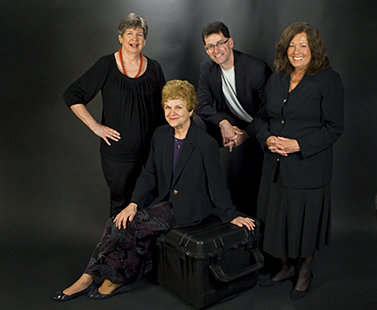USF jumps to top-30 NIH ranking in nursing research
Highly competitive National Institutes of Health awards now account for 65 percent
of the USF College of Nursing’s total research funding
Tampa, FL (March 31, 2010) — The University of South Florida College of Nursing has achieved its highest research ranking ever from the National Institutes of Health. The College ranked 30th among nursing schools nationwide in NIH funding for 2009* – vaulting from a 66th place ranking in 2008.
USF nursing faculty members attracted more than $1.53 million in NIH in 2009 for research including palliative and end-of-life care, stress reduction in breast cancer survivors, and postpartum stress and immunity. They surpassed all other Florida nursing schools most recently ranked by the NIH, including the University of Miami and the University of Florida.
The latest round of NIH research rankings, released earlier this month, has the USF College of Nursing gaining ground on nationally-prominent nursing schools at the University of Nebraska Medical Center, Emory University and the University of Maryland-Baltimore, to name a few.

Dr. Kevin Kip, executive director of nursing research at USF Health, with the three senior faculty members attracting the most NIH awards to the College of Nursing — from left to right, Dr. Susan McMillan, Dr. Cecile Lengacher and Dr. Maureen Groer.
Grants and contracts from federal sources, including NIH, are considered among the most competitive and coveted funding sources.
“The ranking is a credit to the skill, persistence, creativity and experience of our faculty,” said Kevin Kip, PhD, executive director of the Research Center at the USF College of Nursing. “The fact that we’ve managed to substantially expand our research portfolio in such a competitive environment — at a time when the NIH is funding fewer and fewer grant applications — is quite an accomplishment.”
“This is an impressive achievement that takes team effort, support, and plain old hard work. I am so excited about taking over the helm with such outstanding colleagues,” said Dianne Morrison-Beedy, PhD, who will join USF Health April 30 as the new nursing dean. A federally-funded researcher herself, Dr. Morrison-Beedy was assistant dean for research at University of Rochester School of Nursing – a school ranked seventh in NIH awards.
The USF College of Nursing’s total funding for research and contracts increased 120 percent over the last four years, from slightly over $1.3 million in fiscal year 2006-07 to more than $2.8 million in 2009-10 (state fiscal year-to-date). In that same period, NIH funding climbed from $324,832, or 25 percent of total awards, to more than $1.8 million, or about 65 percent of total awards.
Three senior faculty members – Maureen Groer, PhD; Cecile Lengacher, PhD; and Susan McMillan, PhD – pulled in the most NIH research funding at the USF College of Nursing in 2009. All three were successful in winning economic stimulus funding from NIH, available through the American Recovery and Reinvestment Act of 2009, to help supplement their ongoing studies.
With support from the National Institute for Nursing Research (NINR), Dr. Groer is tracking changes in women’s immune systems in the months following childbirth, including how breastfeeding may influence postpartum stress and immunity. Dr. Lengacher is conducting a clinical trial funded by the National Cancer Institute (NCI) on the use of mindfulness-based stress reduction for breast cancer survivors. Dr. McMillan leads a NCI-sponsored clinical trial on managing medication-induced constipation in cancer patients; she is also testing a NINR-sponsored psychoeducational intervention to teach family caregivers how to better cope with specific symptoms of hospice patients with heart failure.
Dr. Kip points to the vision and leadership of Patricia Burns, PhD, who steps down as USF’s nursing dean after 12 years, in helping the University advance its research stature. Dr. Burns vigorously supported dedicating the time needed for faculty to pursue grant writing and conduct research studies. Working with Dr. Kip, she also strengthened the College’s research infrastructure – including establishing this year a new Biobehavioral Laboratory, which supports state-of-the art biological data analysis for several faculty and student projects.
The strong showing in the NIH research ranking will help the College of Nursing in its national recruitment of top-level nurse scientists – both faculty and research-oriented master’s and doctoral students, Dr. Kip said. It will also bolster the College’s prospects for a prestigious NIH Institutional Research Training Grant (T32), a program to support novel and advanced training of predoctoral students and postdoctoral fellows, he said.
– USF Health –
USF Health (www.health.usf.edu) is dedicated to creating a model of health care based on understanding the full spectrum of health. It includes the University of South Florida’s colleges of medicine, nursing, and public health; the schools of biomedical sciences as well as physical therapy & rehabilitation sciences; and the USF Physicians Group. With more than $380.4 million in research grants and contracts last year, the University of South Florida is one of the nation’s top 63 public research universities and one of only 25 public research universities nationwide with very high research activity that is designated as community-engaged by the Carnegie Foundation for the Advancement of Teaching.
*Note: Federal fiscal year beginning Oct. 1, 2008 and ending September 30, 2009.
Story by Anne DeLotto Baier, and photo by Eric Younghans, USF Health Communications

